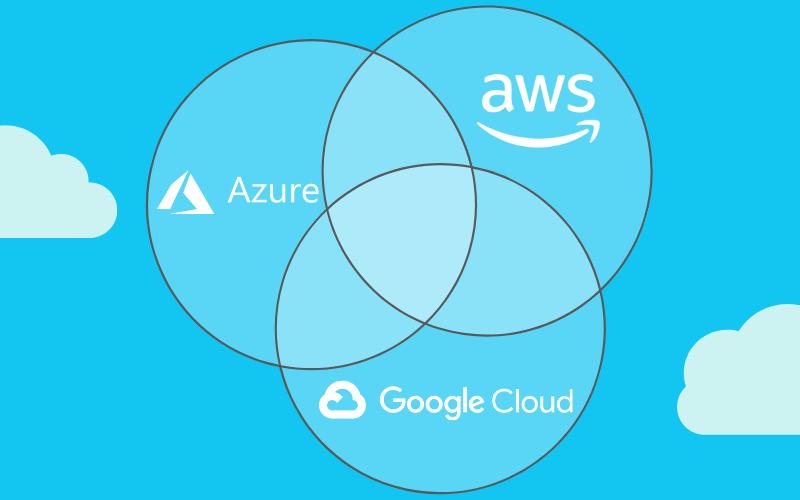This is the war between Amazon, Microsoft and Google to get the best system in the cloud so that developers can create software with artificial intelligence
The explosion of cloud computing systems in the last 15 years has removed much of the hurdle to accessing the unlimited computing power of Amazon, Microsoft and Google.
The big technology companies, however, have opted for an option that is not limited to simply renting this computing power to developers.
They also sell them pre-built tools to integrate into their own apps or platforms, and artificial intelligence (AI) has become the latest of these tools.
Algorithms previously reserved for deep learning experts are now within the reach of anyone with an internet connection and a credit card.
Jerry Chen, a partner at venture capital firm Greylock, describes AI services as "the whales of the cloud" in a report on the current state of the industry. The reasons for this description are the billions invested in this category within cloud-computing.
Chen's report, called "Cloud Castles," reflects how much money the cloud giants have poured into this space. Amazon Web Services offers 26 AI services, Microsoft Azure offers 37, and Google Cloud Platform 11.
Companies are adding artificial intelligence to their product portfolio to secure a share of the trillions of dollars in revenue that giants like PwC expect AI tools to generate. And as this happens, those same AI services allow developers to more easily adapt the tech giants' AI to their own needs.
The sale of AI tools fits perfectly into the cloud computing business model, where prices are based on the consumption of computing resources.
Creating AI algorithms requires a high level of computing power if the developer in question does not use a pre-built solution. And furthermore, regardless of whether the algorithm is custom or pre-built, the AI uses computing power every time it makes a decision.
Therefore, every AI decision is a small profit for cloud giants like Amazon Web Services (AWS), Microsoft Azure, or Google Cloud Platform (GCP).
The pandemic has unleashed the unstoppable force of the cloud and Amazon, Microsoft and Google are only increasing their power
The reliability and long-term projection of these revenues from AI services is what makes them a raw battlefield between the cloud giants.
Each of these companies, moreover, has found a way to specialize based on its own strengths, whether it's Amazon's size and e-commerce data, Microsoft's vast network of partners, or cutting-edge labs. research and Google search data.
There's an old saying in the IT business industry that "No one got fired for buying IBM" which goes to say that IBM is a safe bet because of its proven reputation as a trusted vendor.
Asked by Business Insider if there is such a thing as IBM in the cloud and AI market, Greylock partner Chen laughs and replies, "Not yet," adding, "Amazon is the market leader." Clearly. I don't know if they're a safer bet than the other two, but Azure and Google are definitely moving up the ladder."
Amazon Web Services capitalizes on its size and market share
Amazon maintains its lead as the largest provider of cloud systems, and its size has catapulted its AI platform, SageMaker.

SageMaker has tens of thousands of customers, according to information revealed by Amazon CEO Andy Jassy, who provided the stats in an interview in December before taking on his current role. Within this large client base are large companies that have built their star algorithms on the platform, such as Intuit, GE Healthcare, and Tinder.
One of SageMaker's strengths is its integration into Amazon's other cloud products, Chen explains. Developers can easily take large amounts of data that is already stored on the Elastic Compute Cloud network and use it to train their algorithm.
SageMaker is intended for use by data analysts, not so much by AI researchers or engineers, but another tool called SageMaker Autopilot also allows developers to build algorithms using an automated model training and deployment process.
As for the pre-built AI services that Amazon sells to developers through application programming interfaces, the company says many of them are based on the same algorithms used on Amazon.com.
Amazon's custom recommendation engine, demand forecasting, and fraud protection algorithms are sold with a seal of trust that builds on the reputation of Amazon's e-commerce empire.
In addition, as expected in the company responsible for Alexa, Amazon sells the fundamental building blocks to create a voice assistant. It does this through 2 services called Lex and Polly: Lex brings chat bots to life, while Polly is a text-to-speech service.
The cancellation of the Pentagon's multimillion-dollar JEDI contract is the clearest sign that the next great cloud computing revolution is here
AWS also offers its service called Mechanical Turk, which pays workers pennies for completing small tasks — like identifying what object is in a photo — a way to manually review the algorithm's output.
Amazon, however, has a reputation for being a provider of cloud systems, not a business partner. The giant sells its customers the tools they need, but also competes with them, rather than assisting them in building their business and fostering partnerships.
While building some business for free isn't an expectation in the AI space, the partnerships Microsoft is working on could turn some of its customers into new business to invest in. "I don't think Amazon has been successful in building a ethos where they're going to offer you clients to partner with startups," says Matt McIlwain, chief executive officer at Madrona Venture Group.
"I always say half jokingly that Amazon has a model under which you have to find your own customers."
Microsoft Azure is sold as the most complete solution
In contrast to Amazon's strategy, under CEO Satya Nadella, Microsoft has succeeded by relying on a broad network of partners that serve as a complement to Microsoft services.
This policy has been key to company-wide plans to put partners first, under which Microsoft offers customers not only its services, but access to industry connections and contact with other partners.
"I think Microsoft is better at looking at a portfolio of customers and figuring out how they can complement the services they already have in Microsoft or Azure," McIlwain argues. And some Microsoft partners seem to think like him.
Berg, a Boston biotech company, has just announced a deal with Azure to promote its algorithms in medical institutions around the globe. Berg CEO Niven Narain tells Business Insider that using Azure to repackage and deploy the company's algorithms in different countries has been easy, ensuring they operate legally under different data laws.
The new Microsoft cloud for retail: AI to detect fraud, more connection between workers and personalization for the client
Naran further argues that Microsoft has not only helped as a data center provider, but as a partner. "Azure has not only provided us with computing power, it also has strategic relationships with small and medium-sized companies that Berg can benefit from," says Naran. "Therefore, there is also a business development perspective."
Microsoft, like Amazon, also has an AI platform called Azure Machine Learning Studio that offers low-code products to make life easier for both developers and people without AI skills to create their own machine learning algorithms.
Azure Machine Learning also has more advanced options for data engineers. Prebuilt algorithms are also part of Azure's offering, under its Azure Cognitive Services division.
Microsoft, finally, is in the middle of an acquisition process of Nuance, which has a business selling natural language understanding and voice recognition systems in the cloud.
Google Cloud Platform adds a bit of AI everywhere
Google's artificial intelligence may turn out to be the most eye-catching among the 3 competitors, with extras including its Duplex algorithm for automating calls to restaurants for reservations, or algorithms from its sister company, DeepMind.
Google's artificial intelligence prowess, however, has yet to spark a push that poses a serious threat to Amazon's dominance in the cloud.
Google has high-caliber clients within its AI offer, especially in sectors where the dispute is strong, such as health, where the 3 cloud giants compete for a market of 140,000 million dollars.
Google has a contract with the American Against Cancer to algorithmically analyze medical images. It has also signed a contract with John Hopkins University, as part of a program that reduces the analysis of brain scans from hours to seconds.
Both Greylock's Chen and Madrona's McIlwain point to Google's ability to integrate artificial intelligence into its already widely used products, such as data warehouse service BigQuery.
Google sells, for example, BigQuery ML, which allows people to build algorithms on top of BigQuery data by making SQL requests.
Google was a pioneer in AI research and development, publishing TensorFlow, a framework that enables easy creation of artificial intelligence algorithms.
Chen argues that this vantage point may help Google minimally, but hasn't had a significant impact for the company in the context of cloud AI, especially when the competition is focused on making AI easier for cloud workers. technology sector who do not know what is the framework of artificial intelligence.
Even so, Google has announced this year the launch of Vertex, its own platform similar to SageMaker or Azure ML Studio. The service can also be complemented by Vizier, a Google service that automatically refines algorithms to adjust the accuracy of the data.
A Google Cloud spokesperson argues that the company sees its opportunity in the "democratization of machine learning" space, with the notion of helping more users implement AI in their businesses.
The rest of the industry is not far behind
Although each cloud company has its specific strengths within different applications of artificial intelligence, they are not the only players on the board, especially since venture capital investors have poured some 4,000 million dollars into cloud startups. this industry between 2019 and 2020, says Greylock.
The report by Greylock states that alternative competitors to the 3 cloud giants offer 44 AI services, of which 15 have reached the unicorn level — more than $1 billion in valuation.
DataRobot, for example, treats these AI services as competitors and partners at the same time, offering its clients the ability to design machine learning algorithms that they can deploy anywhere, whether in the clouds of tech giants, or on desktop computers. users.
The clear market leaders, however, are AWS and GCP, details Tracy Woo, an analyst at Forrester. Woo tells Business Insider in an email that these companies have an advantage due to their ability to offer economies of scale, while also investing in frameworks like SageMakers, where AI expertise is not required to create AI tools.
This article was originally published on BI Prime.








